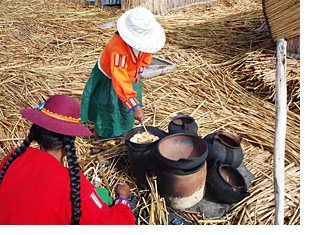|
||
| No Ordinary Christmas
By Irene Butler |
||
| Lake Titicaca
is a name all school kids know and giggle at, although most have no idea where
it is - straddling as it does the border of Peru and Bolivia. Coming over a rise,
our first view of its sapphire waters is stunning—170 km in length, it looks
more like an ocean than a lake. Having travelled through Peru for three weeks
in November and December, my husband Rick and I decide on spending the Christmas
season here.
As our bus enters the lakeshore city of Puno, the magical sounds of flutes, drums and bells float across the air. Craning our necks out of the window, we see elaborately costumed dancers twirling to the rhythm of the music. “Puno is the festival capital of Peru!” says our bus driver. “The whole town participates in more than 300 a year.” Hoisted above the heads of four carriers a gigantic wooden babe in a crib conveys the message of this joyous celebration. After stowing our bags at our hotel we join the lively crowds along the street. We purchase alpaca toques with earflaps for the folks back home, snack on ceviche (a Peruvian specialty of raw fish marinated in spiced lemon juice) and book a Lake Titicaca Island excursion.
Everything is made of reeds - houses, furniture, and Viking-like dragonhead boats. We test out a reed bench while the village leader demonstrates how the island’s base is built. Huge blocks of buoyant roots are harvested from the lake bottom. Once secured together and anchored, they are piled with criss-crossed layers of cut reeds until the surface is out of the water and sturdy enough to support community life.
The aroma of frying bread wafts from an iron pan set over a small fire – we are captivated when the women sing a carol while offering us the warm brown rounds “as a Christmas gift” Juan says smiling. Another two hours brings us to Taquile Island. The inhabitants
speak Quechua, the ancient Inca language, and hold strongly to traditional ways
of life. Listen up fellows – the men do the knitting here, and are renowned
knitters at that, learning the trade from early boyhood.
Roco, our hotel manager, and his wife Maria invite us to share their Christmas Day supper. Knowing the fare might well be guinea pig, eaten widely in Peru, we don our “try anything once” attitude. A feast awaits as we join a dozen or so guests. And yes, one of the many courses is Cavia porcellus, which tastes rather like chicken, although there was no mistaking its form. Alpaca, roasted Inca style, is served to table on flat hot rocks just lifted from an open wood fire. The fireplace is then stoked for an evening of camaraderie while we sip fine wine. It was an enlightening experience being so far removed from our country of plenty, and in the midst of a simpler, less affluent world. The differences of customs and traditions dissolved in the universal message of love, peace and good will as shown us by our Peruvian hosts. Truly an unforgettable Yuletide celebration.
This week Traveling Tales welcomes freelance travel writer Irene Butler who lives in Richmond, a suburb of Vancouver, B.C. About The Photos: 1. Uros 4 –
Boat (Photo: Rick Butler) |

 Lake
Titicaca, the world’s highest navigable lake (at 3820m) competes with the
sky for the deepest shade of blue under a brilliant sun. We skim over the glassy
surface towards the Uros Floating Islands. “Step carefully and watch for
soft spots”, our guide Juan says. I warily step onto the damp spongy surface
of totora or reeds, then relax as I catch sight of children running effortlessly
toward us and women going about their daily chores. Most of the men are out fishing
or trapping waterfowl.
Lake
Titicaca, the world’s highest navigable lake (at 3820m) competes with the
sky for the deepest shade of blue under a brilliant sun. We skim over the glassy
surface towards the Uros Floating Islands. “Step carefully and watch for
soft spots”, our guide Juan says. I warily step onto the damp spongy surface
of totora or reeds, then relax as I catch sight of children running effortlessly
toward us and women going about their daily chores. Most of the men are out fishing
or trapping waterfowl. Juan
explains the “why” of this water-world: “The Uros people took
refuge here to escape Inca domination, and later to avoid Spanish slave labour
in silver mines.”
Juan
explains the “why” of this water-world: “The Uros people took
refuge here to escape Inca domination, and later to avoid Spanish slave labour
in silver mines.” After
wishing our family back home in Canada “Feliz Navidad” by phone, we
walk to a small colonial church for Christmas Eve mass. We didn’t need to
understand the language to be uplifted by the choir and the brightly decorated
altar.
After
wishing our family back home in Canada “Feliz Navidad” by phone, we
walk to a small colonial church for Christmas Eve mass. We didn’t need to
understand the language to be uplifted by the choir and the brightly decorated
altar.